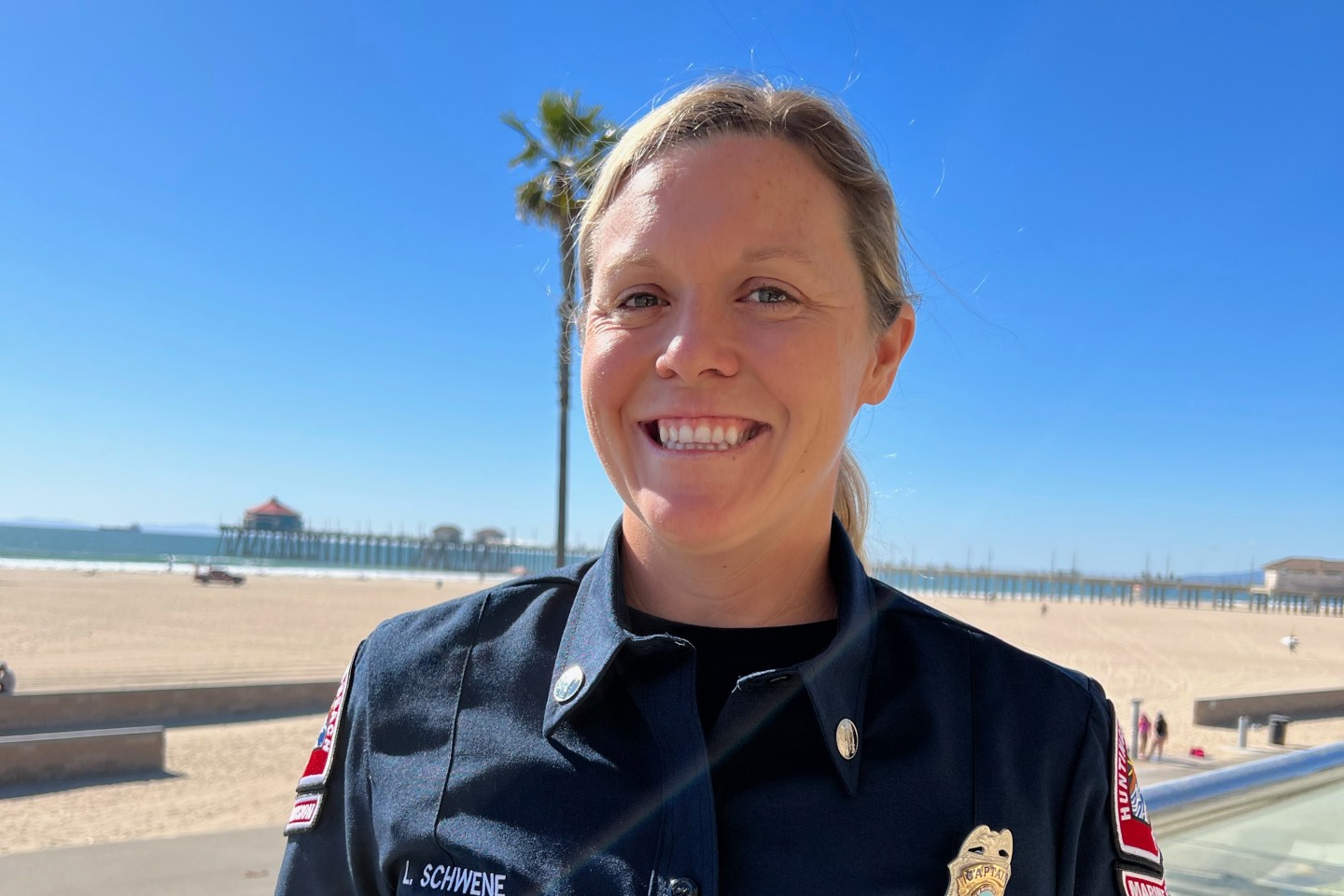For Leslie Schwene, teaching water safety and finding ways to expand drowning prevention are mission critical.
Most of her work takes place in an open-water environment, serving as marine safety captain for the Huntington Beach (Calif.) Fire Department. However, the language of water safety is universal, so Schwene has worked to build bridges between those who work in pool settings and open-water lifeguards.
Schwene is also Huntington Beach’s first female marine safety captain – a role she takes seriously, noting that representation helps more women join the field.
Ocean beginnings
Schwene’s journey began when her mother, a neonatal nurse aware of the risks of drowning, enrolled her in the Junior Lifeguard program.
“She told me that if I wanted to go to the beach in high school without her sitting on the towel, I had to learn about beach safety,” Schwene recalled.
From ages nine to 17, Schwene spent every summer on the sands of Huntington Beach, Calif., first as a junior lifeguard and later as a seasonal ocean lifeguard. In 2010, she officially joined the Huntington Beach Marine Safety team, moving through the ranks to achieve her dream of becoming a full-time lifeguard in 2021.
A significant part of Schwene’s work has focused on teaching the public about beach safety — something she has always felt passionate about. In 2015, she co-founded the Surfer Awareness and Lifesaving Techniques (SALT) program after noticing that surfers were making rescues when lifeguards weren’t on duty. The program teaches surfers how to recognize hazards, respond to emergencies, and perform basic rescues.
While the lifeguard tower is staffed throughout the year, some towers may be closed during the off-season. So when surfers know how to respond to an emergency, Schwene says, they have the potential to save lives.
“They might be surfing in one of the less populated areas and might be the first people to respond before we get the call,” she says.
The program has trained countless surfers and gained recognition at global conferences such as the World Conference on Drowning Prevention.
Safety in all waters
Schwene wanted to develop a better understanding of what contributes to drowning risks.
In 2018, she earned a master’s degree in emergency and disaster management from Georgetown University, using her studies to delve deeper into the global drowning crisis. Her master’s thesis examined factors contributing to drowning risks and highlighted successful prevention programs worldwide.
While Schwene’s career began with a focus on ocean safety, her work has increasingly addressed drowning risks in pools as she began to learn more about where drowning happens most often in her own community.
“Huntington Beach is an affluent community,” she says. “There are a lot of residential pools, and when you look at the data, that is where a lot of our drownings happen.”
Recognizing that shifted her focus from open water beach safety to include all types of water safety.
Schwene spearheaded initiatives such as giving out water watcher tags, which remind adults to designate a responsible supervisor who is focused on watching the water with no distractions when children are in or near water.
She also rebranded Huntington Beach’s annual Ocean Safety Day to Water Safety Day to make it inclusive of all the places people can encounter water in the Huntington Beach community.
“The skills you can learn in a pool will then translate to the ocean if you can swim,” she said.
With the Beach Rangers program, Schwene reaches another audience. Launched in collaboration with a junior lifeguard program coordinator, the initiative introduces children from socioeconomically disadvantaged areas in Huntington Beach, such as Oak View, to water safety.
Kids in this community live only 5 miles from the beach, but they don’t think it’s a place for them, Schwene explains. The Beach Rangers program, meant to introduce the kids to the beach and help them get comfortable around the water, resembles junior lifeguard programs but without the stringent swim requirements. It provides swim lessons to Oak View children, with the ultimate goal of preparing them to join the junior lifeguard program. The program is delivered trough a grant from the Pool Safely campaign, in partnership with the city’s community services, which runs all of its aquatics programs.
Breaking barriers
As a lifeguard, Schwene saw rivalries develop between pool and ocean lifeguards. But as she moved deeper into her career, she realized pool lifeguards and aquatics facilities abide by the same mission — teaching people to swim, giving them the skills they can use in the ocean.
Through several of her programs, Schwene has worked to foster collaboration and bridge communication gaps between these two groups.



